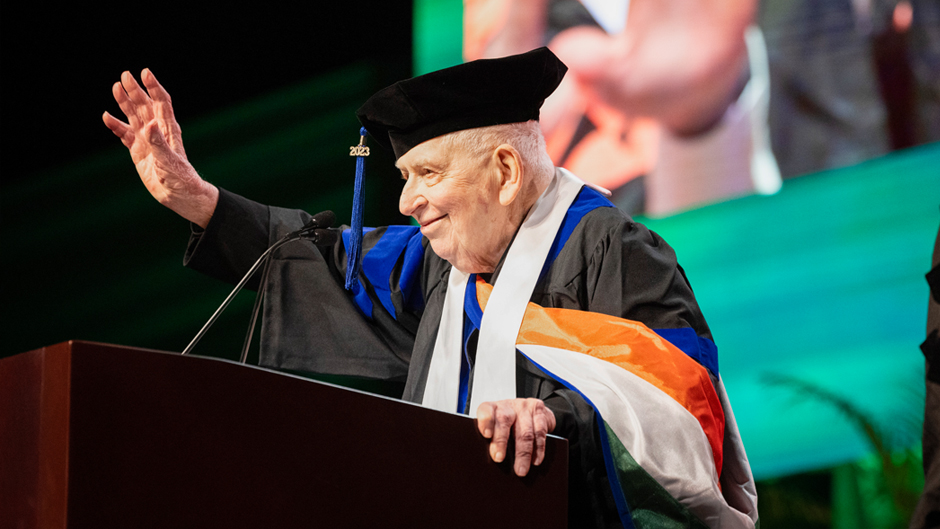In the mid-1950s, when he was the Ibis Yearbook editor and on staff with The Miami Hurricane while pursuing first his undergraduate degree and then a master’s degree at the University of Miami, Allan Herbert gleaned some critical lessons that helped him excel as a student and that later served as the bedrock of his extraordinary life success.
After graduating with Patti McBride—whom he met while studying there, married, and who then became Patti Herbert—his lifelong partner—Herbert went on to become highly successful as an insurance accountant and hotelier, raised a family, and has contributed generously to the University. The Herbert name, in recognition of his and Patti’s philanthropy, is ubiquitous on the Coral Gables Campus, found on the Herbert Wellness Center and the University of Miami Patti and Allan Herbert Business School.
The couple’s impact can also be found in the School of Nursing and Health Studies, the School of Law, the School of Education and Human Development, the Institute for Advanced Study of the Americas, the Department of Athletics, the Lowe Art Museum, Student Affairs, and Alumni Relations. In addition, Sylvester Comprehensive Cancer Center—part of the Miller School of Medicine—bears evidence of their largesse.
Now 88, Herbert applied the lessons he learned about deadlines and motivation once again, earning a Ph.D. at the business school that carries his name. Last Thursday, he offered a special address to graduates and shared some of his advice.
“As an undergrad, I had as many journalism credits as I did in accounting. I was fortunate because as a former journalist I knew about deadlines,” Herbert said.
“My goal in life has been to always do better and not accept the status quo,” he added. His success in the professional world with the conglomerate Teledyne had much to do with being a problem solver and setting rigid deadlines and reporting back, skills that he applied to his dissertation—“The Rise of Wealth and Income Inequality”—and to his dissertation committee that included Alex Horenstein, associate professor of economics, and Manuel Santos, professor of economics; Miguel Minutti-Meza, professor of accounting, and Emmanuel De George, associate professor of accounting; external members Edward Dauer, professor of clinical with the College of Engineering; and Carlos Seiglie, professor of economics at Rutgers Business School.
“This thesis has been one of my most important lifetime projects and is dedicated to the memory of my wife,” he wrote in an Alumni Newsletter acknowledgment. His wife, Patti, passed away in July 2020 at the age of 84.
Herbert grew up in Miami. He is proud to have attended public schools, first North Beach Elementary and then Miami Beach Senior High, both located in the hub of the Jewish community on Miami Beach.
His grandfather, who emigrated from Russia in 1923 to escape the Russian Revolution, was influential in his early life.
“He worked his tail off, didn’t speak English, didn’t have a penny to his name, and ended up a millionaire,” Herbert said. “You have to learn how to apply yourself, and I was self-motivated, but my grandfather was a motivation for me, too.”
These were segregation years in Miami, and Herbert remembered riding the buses with white people up front and Black people relegated to the back. Those experiences seeded what would become the theme of his Ph.D. dissertation.
“As a kid, I never accepted segregation,” he recounted. “I’d get on the bus and instead of sitting up front, I’d sit in the back—that was part of my individual protest.”
“So, when we got to discussing possible topics, I suggested income inequality,” Herbert said. “Maybe that sounds more like sociology than economics, but that was how I felt. And we developed a dissertation based on that—and one of my professors said it was the best he’d ever seen.”
Herbert’s doctorate research focuses on four major industrialized countries—the United States, France, Germany, and the United Kingdom—in the post-World War II era. His work addresses the substantial rise in aggregate wealth documented during the past five decades and explores the relationship between economic growth and income inequality. The novel aspect of his research lies in identifying the “stock-market channel” as a potential driver of income inequality.
“The story I’m trying to tell is not about my business or academic career but how I figured out how to complete a dissertation within a certain time. It’s about having a plan and figuring out how to execute the plan,” Herbert said.
Herbert explained that he waited until he retired to pursue his doctorate degree, though that milestone took longer to reach than expected. And even now, he finds himself as busy as he has ever been.
“Now I have to figure out what I do with the rest of my life,” he said, noting that he has “a number of things in the hopper,” including publication of an academic paper based on his dissertation’s work and advancing the University’s role as a global institution with a hemispheric focus.
Herbert sees his life trajectory, from being born and growing up in the Depression years to earning his doctorate at age 88, as a series of challenges.
“Maybe that’s what my whole life is about—about challenge,” Herbert said. “And it’s about succeeding with those challenges.”

